After a brief chat with a lady from Benfleet, who was heading back down to Gravelines with her husband, we did a quick hike up to Merwekade at the top end of Dordrecht. Towards the end the quick hike became a sprint as we dashed to catch the water bus that would take us to the Hollandse Biesbosch. We leapt on and the water bus left immediately, heading along the Beneden Merwede. The craft was a catamaran, and fairly zipped along the waterway shooting through the gaps between barges.
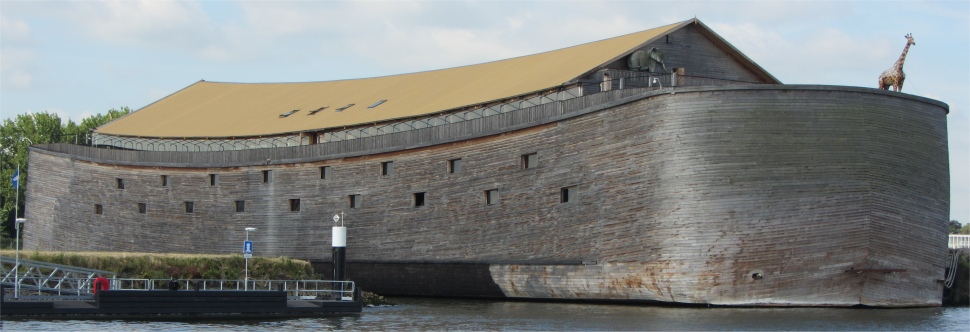 Noah's Ark |
In no time at all we were alighting at the Biesbosch staging, and took a short walk through shaded pathways to the Biesboschcentrum Dordrecht. This was a smart spacious complex with copious amounts of display boards covering the flora and fauna of the area, plus plenty of hands-on activities for young folk.
The Biesbosch National Park was an extensive freshwater tidal area that was within easy and fast reach of Dordrecht. These unique wetlands arose after a natural disaster. In 1421, the St. Elisabeth flood inundated and partially submerged the land around Dordrecht. This flood disaster engulfed 16 villages, and the region changed overnight into an inland sea that stretched all the way from Dordrecht in the northwest to Geertruidenberg in the southeast. Now the tides were able to enter from the sea without any obstruction. The Maas and Rhine rivers carried an enormous amount of sand and silt from upstream, and their sediments were deposited at the turn of the tide in the areas where the tidewater met and mixed with the river water. In the centuries that followed a rugged natural area arose, with osier and reed beds, sandbars and meandering creeks. On the emerging sandbanks the first vegetation appeared: rushes followed by reed. It made the area interesting for the reed and rush culture. The abundance of rushes gave this new area its name of "Bies-bosch" (Rush-woods). As the land rose, reed disappeared and willows began to grow. Withy-beds on areas outside the dykes were mentioned in documents dating back as far as 1560. For centuries there was willow cultivation in the Biesbosch. Until a few decades ago, the Biesbosch was a rather inaccessible area known only to poachers, adventurers and osier workers.
The value of the Biesbosch as a natural area was recognised at an early stage. From the 1950s onwards, the State Forest Service bought parts of the Biesbosch to preserve the natural environment as much as possible and to protect it from exploitation and other undesirable use. Some developments however could not be stopped and parts of the Biesbosch were given up for other public interests. In the Brabant section three large drinking-water reservoirs were constructed after 1970. With the use of cleaner water of the Maas river the quality of the drinking water in Rotterdam had been improved.
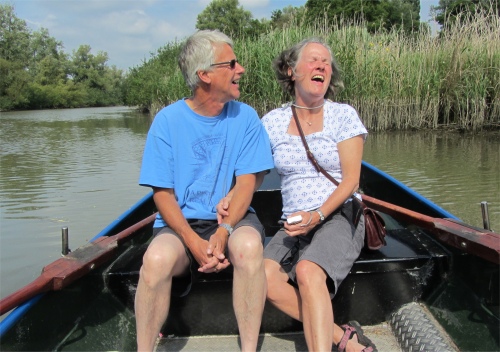 Rex Shares a Joke Amongst the Reed Beds |
The Biesbosch National Park was an area with an ecosystem that had become very rare in Europe, namely the fresh-water tidal area. Today the vegetation consisted mainly of willow woods that developed out of the willow-shoots of former withy beds due to decades of neglect. These marshy woods alternated with grasslands and reed-lands that had now run wild with weeds. The grasslands in the Biesbosch were the property of the State Forest Service, which leased them to local farmers with the proviso that there will be no use of fertilisers and herbicides. Hay lands in the Sliedrechtse Biesbosch had become very flowery due to this policy. Since the closure of the Haringvliet, the number of mammals had increased too, with animals such as roe deer and more recently foxes appearing.
 Grebes Having Fun |
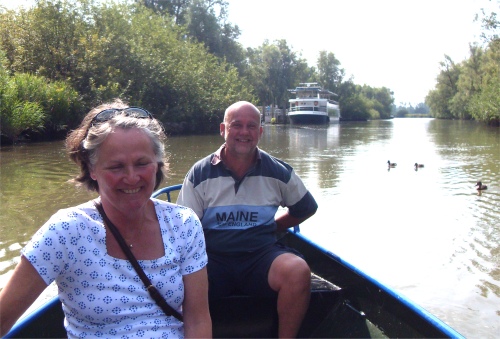 Hilarity All Round |
My boat mates were so overcome with the beauty of it all, that for a moment they forgot all about my presence and engaged in a romantic embrace. Soft, stringed music emanated from the reed beds; I felt like announcing that I could feel a song coming on. It was a very touching moment for the two of them, in more ways than one. I had no bucket of cold water to hand. My scraping of the boat over the bed of the shallow channel soon pulled them back to reality. We had this wonder world almost completely to ourselves for most of our circular loop.
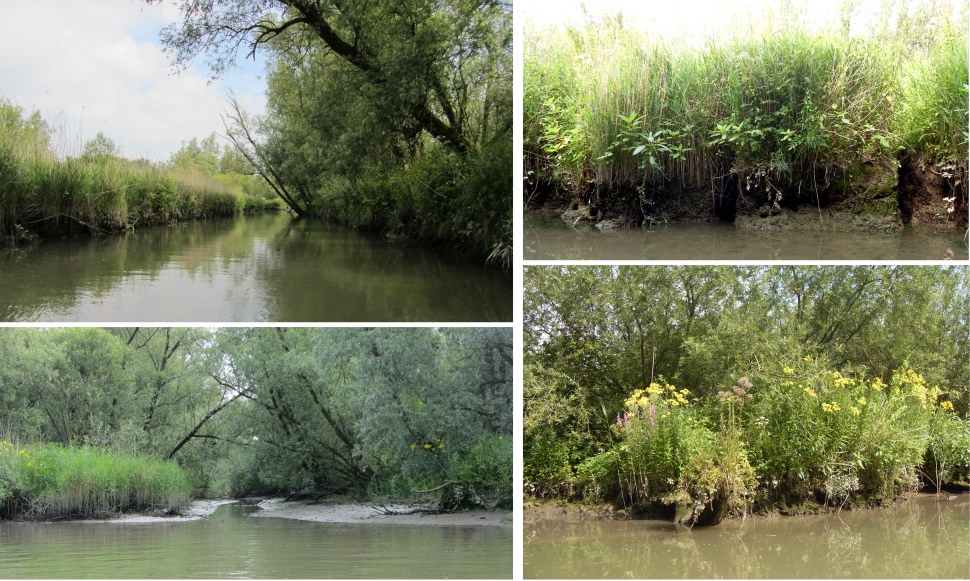 A Flavour of the Biesbosch from the Water |
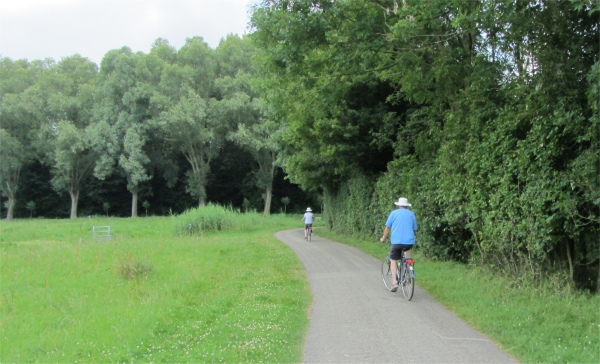 Cycling in the Biesbosch |
The young lad who was hiring out the bikes was getting stressed out. He seemed to be the only one working, and the queue was building up. "There is a short route you can take around this vicinity. Then, if you are feeling energetic you can cycle all the way across to the Nieuwe Merwede, and get some refreshments there from the cafe, Kop van 't Land (Head of the Land)," he explained. Once we got used to the concept of cycling with no brakes (to brake you had to effectively try and cycle backwards), we pedalled off along cycle paths that ran through meadows containing geese and cows, which were bordered by water channels full of lily pads. Clumps of trees provided welcome shade.
 Geese Admiring our Cycling Skills - As If |
We stretched our horizons, extended ourselves, and headed south over the Wantij, a waterway that linked the Nieuwe Merwede with Merwekade, and out into the countryside, skirting Vissershoek, the eastern boundary of the city of Dordrecht. We felt at one with the big Dutch cycling community; there were dozens or other cyclists on our route, all going about their daily business. On reaching the Provincialeweg, we turned east and followed the cycle path alongside it all the way till it stopped at the ferry terminal on the Nieuwe Merwede. Just as the young chap had informed us, slightly to the right was the cafe, Kop van 't Land. It was a warm day and we certainly needed fluids, so we pedalled across to the cafe and placed our bikes in the bike park for the cafe. A large jovial chap came out to greet us, a beaming smile stretched from ear to ear on his ruddy face. A typical hospitable Dutch welcome I thought. He rattled off some Dutch, the smile never leaving his face. I didn't catch it all, just the key meaning - the cafe was closed on Thursdays, and of course it was Thursday. He tried to console us with, "You can get the ferry across the river and cycle to a pub in the village." I thanked him for the advice, but time was moving on and we decided to head back. Reluctantly we retraced our steps, it was a linear route, straightforward for me until the very last 50m where my navigational skills deserted me.
 Nieuwe Merwede Ferry by Kop van 't Land |
 Giraffe by Nieuwe Haven |
There were some really huge guys in here, so we thought it best to keep out of their viewing angle. Despite that, we watched England's final game, a 0-0 draw, but our young team acquitted themselves well. We were out of the World Cup.
Afterwards it was a tasty meal in a restaurant further down Voorstraat. It had a friendly, whacky waiter, and a good selection of English and American music; Rex loves his music. There was only one chef working, so service was a little slow, but hey-ho, we were on our holidays so it didn't matter.
